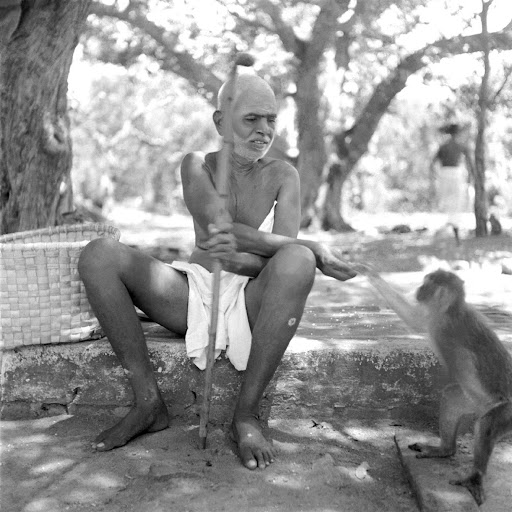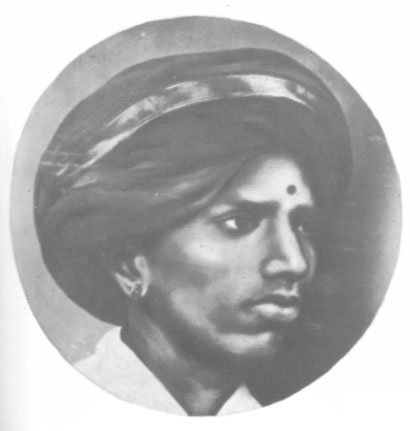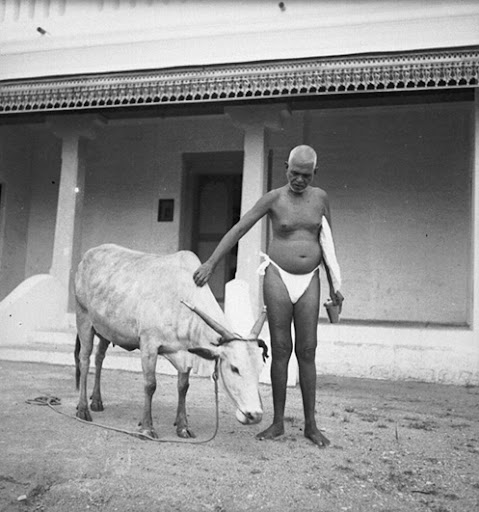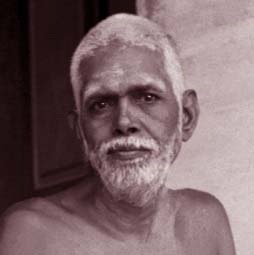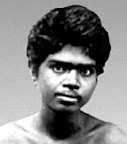(Post in homage to Mother Alagammal)May 19, 1922 (Dundubhi year and Vaisakha month) was her last day; everyone could sense the impending end that day. Yet they had to do whatever was possible in a
spirit of detachment leaving the result to the Lord. As long as she was conscious, Bhagavan gave her spiritual instructions. When she lost consciousness Ganapati Muni
and others commenced vedic chants, some others chanted the Rama-nama.
After the violent gasps (
urdhva-swasa) began, Bhagavan placed his right hand on her heaving heart and the left one on her head. He looked at her intently. The day passed that way. Subsequently Bhagavan himself narrated what had happened thus:
The latent tendencies and thoughts which are the cause of future births flared up. She had just then lost consciousness of the external world. Hence in the subtle world her subtle body was witnessing scene after scene of what was to happen. By this sequence of experiences, the soul went through the future births and travelled towards the highest.
How could she experience this? It was because of the current of Bhagavan's spiritual power transmitted by touch that she experienced all within herself, without having to
be born over and over again. There was a battle between her soul forces and Bhagavan's spiritual power in which her latent tendencies gradually weakened and ultimately got vanquished. Bhagavan actually described the scenes she witnessed in the subtle state including their intensity.
The end came peacefully by eight in the night. Among those present, Ganapati and Niranjanananda Swami heard a sound indicative of the mother's death.
In this manner, the mother's individuality submerged in Atma, God. She attained
mahanirvana. She had no more births. Due to her son, who was Arunachala in human form, she attained
mukti or became established in the Atma.
Mother's body acquired a new brilliance which persisted till the abhisheka on the following day
As the mother's end was nearing nobody in the ashram ate anything that day. After her end, the Maharshi got up, and with no trace of grief said, "We may now eat. There is no pollution." How could there be any pollution when they were in the presence of the Lord in whom the holy lady merged? Such a body was a holy shrine in itself. The ashramites had a quiet meal.
The entire night passed in the singing of devotional songs. According to Manavasi Ramaswamy Iyer, "Bhagavan had no grief whatever. On the other hand, he appeared to be relieved like a bird released from a cage." These words were recorded in his diary. True, why did he have to grieve?
The mother attained the supreme state. Some days after the event somebody remarked to the Maharshi, "Mother has passed away." Immediately Bhagavan corrected him saying "
No, mother has merged, she has become one."
On another occasion, when the matter of his according
mukti to the mother came up, Bhagavan
said, "Yes my attempt in her case was successful. Earlier, in the case of Palaniswami I attempted the same. Thinking that he had attained the ultimate I removed my hand, thereupon he opened his eyes. The
prana passed through the eyes. That is how my attempt at that time failed." On still another occasion, Bhagavan said, "
Where has mother gone? She is here." Hence there need be no doubt as to where Alagammal had departed. The Maharashi meant
that she merged in Easwara and was with him (as he also was abiding in the atma).

Mother has not passed away. She has merged. She has become one.
The question as to whether the body was to be cremated or buried came up on the very night of mother's expiry.
Bhagavan pointed out that according to chapter 13 of Ramana Gita the body of one who attained mukti was to be buried and not cremated. The disciples decided to bury the body. Early next dawn, they carried the body from Skandasramam down the hill to a spot near Paliteertham.
Meanwhile, some relatives from other places came and though they argued in favour of a cremation, they were overruled. The news of the mother's death passed round the town, in spite of every effort to keep it private. As a result, numerous people turned up at the burial ground.Your text goes here.
A pit was dug below an aswatha tree. The body was lowered into it. The pit was filled with camphor,
vibhuti, salt and other aromatic materials and later covered. The disciples erected a brick
samadhi and by some coincidence, a Siva
linga from Kasi arrived just then. It was placed atop the samadhi and named,
Matrubhuteswara (Mother who was Easwara).
The Swami was watching the proceedings as a mere
witness. With the samadhi of the mother the son's filial
duty ended.
As Swami had entreated Arunachala in 1914, the
mother was consumed not by the fire of cremation but by
the fire of
Jnana .
For the Mahapooja day, Ganapati Muni wrote six
verses entitled Soundaryamba
shatkam (Six verses on
Soundaryamba) ? (Soundaryamba has the same meaning
as Alagamma). This is the substance of the verses:
1. In the first quarter of the night of Friday, the ninth
day of the dark fortnight of Vaisakha month, Dundubhi year
2. Wife of Sundaram born in the exalted lineage of
Bharadwaja, Parasara and mother of Ramana Maharshi born
as an avatara of Guruguha (Subrahmanya), the blessed lady,
3. One devoid of any attachment, one cleansed
by
bhakti to Siva, one whose
prana was arrested by the
touch of Guha (Ramana Maharshi), one whose tendencies
were all destroyed that very moment
4. She, Soundaryamba, became that Light which
can be known only by the Vedantic Vakyas, which is all-
pervasive, and which was known by her son.
5. At that samadhi of Soundaryamba the stream
which poured out of the lotus palms of Ramana Maharshi
became a new
teertha, the Aghasamana
teertha (the teertha
which removes all sins).
6. Glory to the holy mother of sacred Ramana!
Glory to the samadhi!
Glory to the linga consecrated by the Maharshi!
Glory to the new Aghasamana teertha!
The Maharshi later said something interesting. After
her passing away, Alagammal's body acquired a new
brilliance which persisted till the
abhisheka on the following
day at the time of samadhi; it disappeared soon after water
was poured. Further, at the last breath in all cases a faint
sound emanates. In the mother's case, Bhagavan did not
notice it but others present did.

Every year, to commemorate the anniversary, pooja
is performed to Matrubhuteswara. Thousands of devotees
from various parts of the world assemble to join the
observance.
(This year the day falls on June 9th, 2007)Photos of Mother's temple are copyright of Sri Ramanasramam






